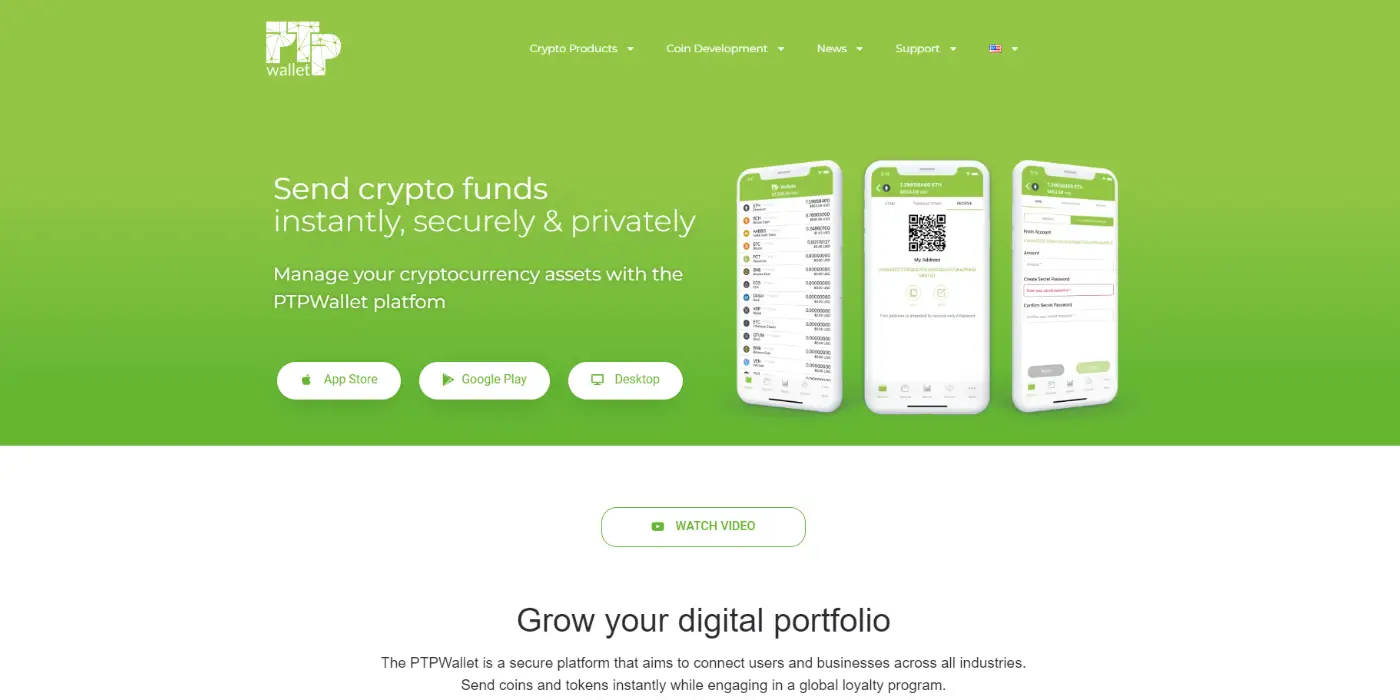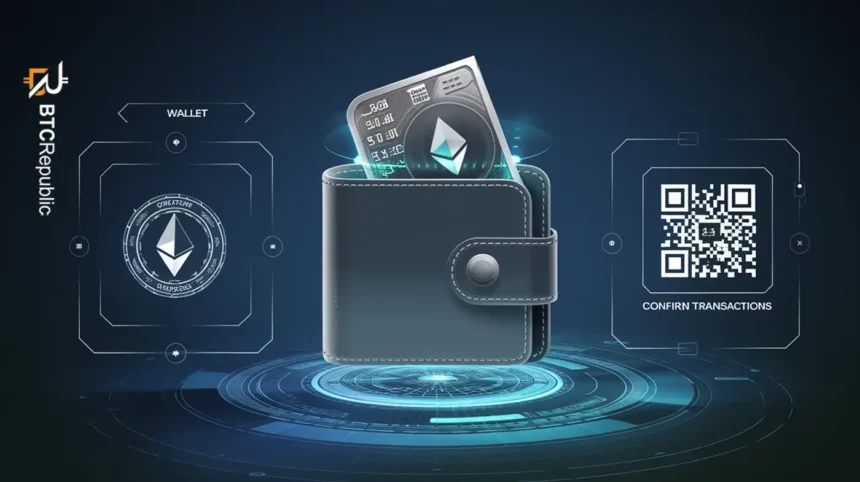Wallets are essential for those who intend to trade or transact with cryptocurrencies because they are needed to store the cryptos you’ll either send or get from others. This necessity explains why there are several competing wallet brands out there jostling to provide a variety of wallet services to crypto enthusiasts.
But how do some of these crypto wallet services come about with the wallets they offer to their customers? One possible answer to this question is through white labeling.
What Is A White-Label Crypto Wallet?
A white-label crypto wallet can be defined as a software program that one company creates and another company rebrands for sale.
Through this approach, businesses can use their own brand name to offer crypto wallet services without having to develop a wallet from the ground up.
White labeling is not peculiar to the crypto industry but is also found in other industries.
How Does A White-Label Crypto Wallet Work?
As noted above, a crypto wallet’s white-labeling process involves licensing an already-designed wallet made by a provider to be adopted by another business.
The business that adopts the white-label solution can customize it according to its branding intentions, ensuring it fits smoothly with its existing offerings.
By rebranding the already-made wallet, the adopting brand significantly cuts down on the time and resources it would otherwise have invested in launching a cryptocurrency wallet.
This makes white labeling an appealing choice for companies eager to quickly become part of the cryptocurrency market.
Key White-Label Crypto Wallet Features
White-label crypto wallets come equipped with numerous features aimed at enhancing user experience and security. Here are some of them:
- User interface (UI): User-friendliness is one of the key attributes of crypto wallets. Most white-label crypto wallets usually come with intuitive interfaces meant to enhance the experience of both novice and old users.
- Security features: White-label crypto wallets implement contemporary security protocols to safeguard users’ assets from threats. Some of these measures include biometric authentication, know-your-customer verification, two-factor authentication, encryption techniques, and private key management mechanisms such as cold storage.
- Customization: A company seeking to utilize a white-label crypto wallet solution can easily customize it to meet its specific demands.
- Cross-chain integration: To maximize user experience, white-label wallet designers prioritize seamless cross-chain integration and compatibility with diverse systems.
- Support for multiple currencies: These wallets usually integrate multiple cryptocurrencies, enabling users to keep all their assets organized in a single location.
- Real-rime tracking of asset prices: Crypto prices can easily be tracked with white-label wallets, allowing users to keep up with market trends.
- QR code scanning: The inclusion of a QR code scanner makes it easier to send and receive cryptocurrencies.
- Transaction features: White-label wallets include functionalities such as transaction history, QR code scanning, and real-time updates of balances, enhancing visibility for better account control.
5 Best White-Label Crypto Wallets In 2024
Selecting the best products or services from a wide range is never an easy task, especially with so many features to consider. However, after in-depth research, the following eventually emerged:
Evercode Lab

Evercode Lab is a tech company that is concerned with developing Web3/Blockchain solutions for businesses.
The company’s wallet allows users to, among others, send and receive over 500 crypto assets supported by six networks. These include leading coins such as Bitcoin, Ethereum, Dogecoin, Binance coin, and Solana.
They constantly update their list of digital assets and add new ones regularly.
The Evercode Lab staking feature allows you to increase your crypto wealth with decentralized networks securely and privately. Cryptos available for staking include Solana, BNB, Matic, Avax, and more.
Evercode Lab Wallet is available on Android, iOS, and the web. It has the following four versions:
- Basic: The entry-level version is ideal for crypto newbies and startups but only has a buy crypto option, unlike the other versions, which have both buy and sell features. It also lacks a staking feature.
- Lite: An extended edition that targets users with more complex needs and goals. Like the basic version, staking is not available for Lite version users.
- Medium: Includes all features in the Basic and Lite editions plus staking (BSC, SOL) and NFT options
- Pro: A full suite of solutions that has all the features of the Medium version plus advanced options such as price charts and WalletConnect.
Pros
- Support for many cryptocurrencies
- Four editions for users to select from
- Supports the Lightning Network to ensure fast and affordable transactions
- Maintenance support
Cons
- No KYC information
- Limited entry-level version
PTPWallet

PTPWallet is a blockchain wallet developed by Core State Holdings, Corp. Its “Convert Module” allows users to sell or exchange tokens/coins of any of over 600 PTPWallet-supported cryptos. Clients can add their own coins for their users to use.
There’s also a geography-based know-your-customer (KYC) process that ensures authorized user access and genuine transactions.
KYC also helps in checking money laundering and terrorism financing. PTPWallet users can be sure of having no problems with regulators in the US and Canada, thanks to its compliance measures in the two countries.
Customers can carry out peer-to-peer money transfers using a QR code, a specific address, SMS, email, Messenger, and social media. These choices make it easier to exchange cryptos and reduce the chance of mistakes.
Its “Market Feature” enables users to view real-time price movements of their favorite cryptos. It is a feature that day traders will find especially useful.
Security measures in the PTPWallet include PIN codes and passphrase protection. PTPWallet can be accessed on Android and iOS devices as well as on the web.
Pros
- Lots of supported cryptos
- KYC verification
- Real-time monitoring of crypto prices
- US and Canada regulatory compliance
- 247 technical support
Cons
- Few security measures mentioned
- Some users may find the website difficult website to navigate
Debut Infotech

Debut Infotech is a versatile technology company with offices in India, the USA, the UK, and Canada. Its multi-crypto and multi-blockchain white-label crypto wallet known as Carteira offers an intuitive user experience, state-of-the-art functionalities, and top-tier security.
Carteira allows users to trade and swap cryptos via a single platform. This helps streamline user experience while also ensuring convenience for users who do not wish to manage their virtual assets in separate platforms or services.
It allows you to easily scan the QR codes of wallet addresses, eliminating manual entry, and thus reducing the likelihood of errors. Carteira also facilitates the connection of payment gateways so that users can make crypto payments directly from its interface.
When it comes to security, Debut employs biometric authentication (such as facial recognition and fingerprinting), as well as secure storage mechanisms and encryption algorithms to check unauthorized access and keep customers’ private keys safe. Integration with the Ledger hardware wallet ensures secure offline storage of private keys.
Carteira allows users to integrate third parties like KYC/AML and other identity verification service providers or analytics companies. This makes for enhanced security and compliance with regulations, as well as gaining useful insights into the behavior of users, including their transaction patterns.
Users can track crypto prices and get notifications on a real-time basis to ensure they are constantly abreast of important market movements or investment opportunities. The wallet is also available on mobile devices.
Pros
- Integration with Ledger hardware wallet
- KYC/AML compliance feature
- Backup and recovery
- Biometric authentication
- 247 technical support
Cons
- No info on the cost of the wallet
Antier Solutions

For over 10 years, Antier Solutions has been helping businesses take advantage of new technologies in or to remain ahead of the constantly changing business environment.
It supports multiple cryptos, can access decentralized applications, and enables token swaps. It also supports NFTs and a crypto staking feature through which users can earn rewards and increase their asset holdings.
Users can easily include and manage crypto tokens not originally supported by the Antier wallet. Withdrawing your crypto is a breeze on the wallet. All you need to do is click on the withdraw feature and then enter the amount to withdraw and your transaction will be completed within minutes.
Antier boasts a multi-layered security framework that includes two-factor authentication and encryption. These help protect user assets against cyber-attacks and other vulnerabilities. Security is further enhanced with integration with the Ledger hardware wallet.
It is also compatible with some other wallets, apart from Ledger. A Transaction analytics functionality facilitates a better understanding of customers in order to provide solutions that best suit their needs.
The WalletConnect mechanism allows for secure communication between web DApps and mobile crypto wallets.
Pros
- 2-factor authentication
- Ledger integration
- Available in less than seven days
- 247 support and maintenance
Cons
- KYC information not available
- Cost of wallet also not provided
Blockchain App Factory

Blockchain App Factory is a multi-dimensional tech business that creates several kinds of crypto wallets. Its head office is in Japan, and it has branches in the US, UAE, Singapore, UK, and India.
The company offers support for a variety of crypto token standards, including ERC 20, TRC 20, and BEP 20. Its cross-chain functionality allows users to transact across diverse blockchains without any need to leave the wallet interface.
Users can develop their own crypto wallet native token and load it with utilities that enhance their business value.
They also feature a token launchpad, which users can leverage to view new initial token offerings on the interface or scanning crypto payments for both online and offline merchant outlets.
You can stake your cryptos in this company’s wallets with the aim of getting periodic rewards. Another notable feature is swapping crypto tokens.
As of the time of writing this guide, their website mentions advanced security features wihout providing specific details. They have both mobile and web versions of their products.
Pros
- Different kinds of white-label crypto wallets available
- KYC functionality (in some versions)
- Backup and recovery
- KYC functionality (in some versions)
- Live human chat
- Technical assistance
Cons
- Not elaborate on security features
Conclusion
Crypto wallet white labeling is a situation where a company rebrands a crypto wallet produced by another company.
It is attractive because it helps companies save the time and costs needed to build a completely new wallet.
Based on comprehensive research, the five wallets above emerged as the best white-label crypto wallets in 2024.
FAQs
-
Why is white labeling necessary?
It helps crypto wallet service providers avoid spending much time and resources needed to build a new wallet from scratch.
-
How long does building a white-label crypto wallet take?
The time it takes to launch a white-label cryptocurrency wallet varies based on the provider and how much customization is needed. However, the process can take anywhere from a few days to a few months.
-
Is white labeling a good option for startups?
Yes. White-label wallets are a viable choice for startups looking to enter the cryptocurrency market. They offer a user-friendly and practical solution that allows new businesses to establish themselves without excessive costs.










